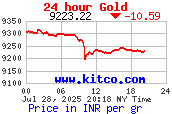SBI Mutual Fund has launched SBI Gold Fund, an open ended Fund of Fund to enable investors to invest systematically in gold. NFO (New Fund Offer) would be invested in SBI Gold Exchange Traded Fund. The corpus collected through the NFO will be invested in SBI GETS, the Gold Exchange Traded Funds offering from SBI Mutual.
SBI GETS, the best performing gold ETF in the last 6 months has given returns of 28.6% as on 18th August 2011 which is 36.57% higher than the BSE Sensex returns of -12.5% as on August 18th 2011. The NFO period is from 22nd August to 5th September.

Benefit of SBI GOLD TRADED FUNDS
It is said that Gold could show some volatility in future. Looking at the current global economic conditions and stock market volatility, gold is a better option hence the Investment in GOLD FUND through SIP route is better option. First time in India any investor could avail gold loans from the country’s largest lender State Bank of India for gold exchange traded funds.
Fees & Charges
Pursuant to SEBI Circular No. SEBI/IMD/ CIR No. – 1/ 64057/06 dated April 4, 2006, the New Fund Offer expenses will not be charged to the scheme and will be borne by AMC.
Load Structure: Entry Load: Not Applicable Exit Load: Exit within 1 year from the date of allotment – 1 %, Exit after 1 year from the date of allotment – Nil. Application Amount: The minimum investment amount is Rs 5000 and in multiples of Rs 1 thereafter. Additional Purchase Rs. 1000/- and in multiples Rs.1000/- or 100 Units or account of Re. 1/- thereof of Re.1/- thereof.
Benchmark Index: The Scheme’s performance will be benchmarked against the price of physical gold. Plans / Options: The scheme offers growth option and dividend payout option. Dividend option offers reinvestment, payout and option.
Asset Allocation: The scheme will invest 95% to 100% of assets in units of SBI GETS and upto 5% in Reverse repo and /or CBLO and/or short-term fixed deposits and/or Schemes which invest predominantly in the money market securities or Liquid Schemes.
Read More...
SBI GETS, the best performing gold ETF in the last 6 months has given returns of 28.6% as on 18th August 2011 which is 36.57% higher than the BSE Sensex returns of -12.5% as on August 18th 2011. The NFO period is from 22nd August to 5th September.

Benefit of SBI GOLD TRADED FUNDS
It is said that Gold could show some volatility in future. Looking at the current global economic conditions and stock market volatility, gold is a better option hence the Investment in GOLD FUND through SIP route is better option. First time in India any investor could avail gold loans from the country’s largest lender State Bank of India for gold exchange traded funds.
Fees & Charges
Pursuant to SEBI Circular No. SEBI/IMD/ CIR No. – 1/ 64057/06 dated April 4, 2006, the New Fund Offer expenses will not be charged to the scheme and will be borne by AMC.
Load Structure: Entry Load: Not Applicable Exit Load: Exit within 1 year from the date of allotment – 1 %, Exit after 1 year from the date of allotment – Nil. Application Amount: The minimum investment amount is Rs 5000 and in multiples of Rs 1 thereafter. Additional Purchase Rs. 1000/- and in multiples Rs.1000/- or 100 Units or account of Re. 1/- thereof of Re.1/- thereof.
Benchmark Index: The Scheme’s performance will be benchmarked against the price of physical gold. Plans / Options: The scheme offers growth option and dividend payout option. Dividend option offers reinvestment, payout and option.
Asset Allocation: The scheme will invest 95% to 100% of assets in units of SBI GETS and upto 5% in Reverse repo and /or CBLO and/or short-term fixed deposits and/or Schemes which invest predominantly in the money market securities or Liquid Schemes.








